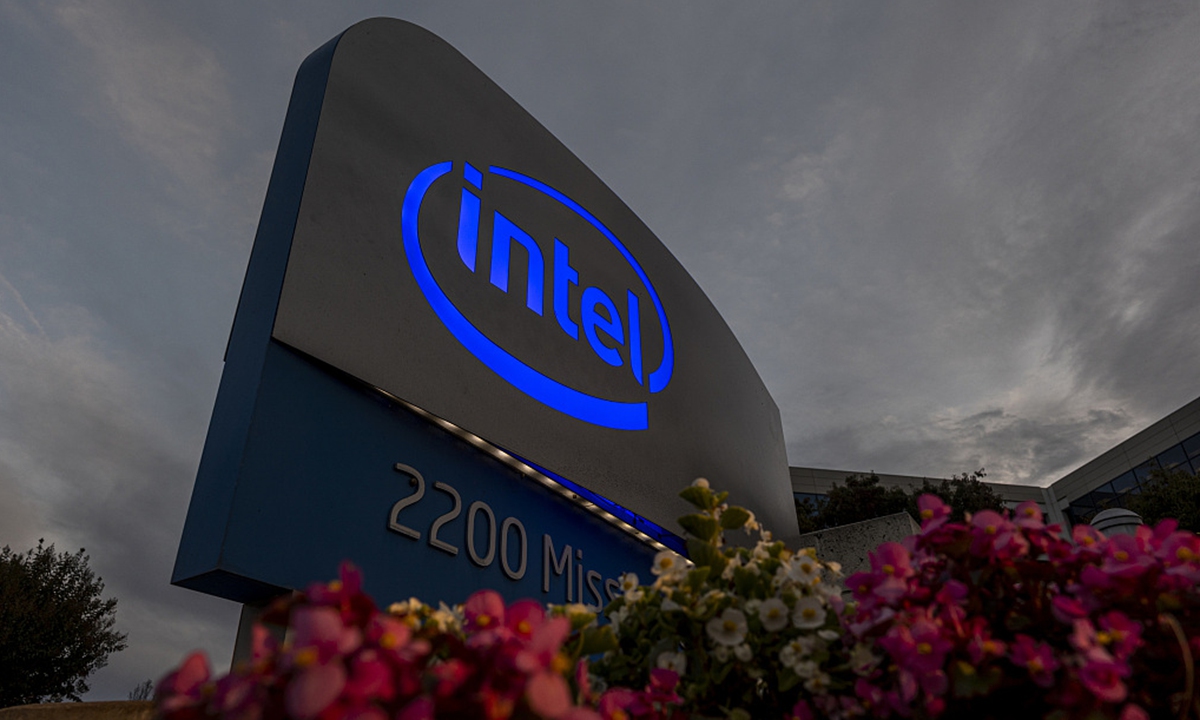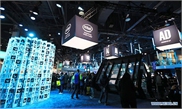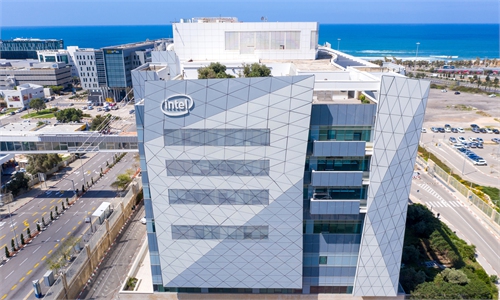Intel apologizes, but angered Chinese netizens demand revocation of Xinjiang boycott statement
Firm requested to revoke its Xinjiang boycott statement

Signage at the entrance to the Intel headquarters in Santa Clara, California, US, on October 19, 2021. Photo: VCG
US chip giant Intel on Thursday broke silence on its controversial move to boycott products and labor from Northwest China's Xinjiang Uygur Autonomous Region, but its belated and insincere apology statement exacerbated fury among affronted consumers in the world's largest computer market.Angered by Intel's failure to correct its attitude toward forged claims about "forced labor" in Xinjiang, some Chinese netizens and experts demanded a revocation of its policy statement containing disinformation on Xinjiang, saying otherwise more commercial ramifications could follow.
In a Chinese-language statement on Intel China's Weibo official account, the US chipmaker said that "we deeply apologize for the trouble caused to our respected Chinese customers, our partners and the public."
It noted that although its original intention was to ensure compliance with US laws, its letter on the Xinjiang issue has caused "many questions and concerns among our cherished Chinese partners, and we deeply regret it."
Intel China disabled the comment section on its Weibo account on Thursday.
Intel's Thursday apology statement, at least two days after its Xinjiang-related fact distortions went viral on Chinese social media, became a trending topic on Sina Weibo, where many netizens were not buying Intel's "weak" statement and taking to their own accounts to lambaste the US firm.
"It feels like Intel said a lot, but at the same time nothing," wrote one Weibo user with the handle "metrolife."
The so-called apology lacks sincerity, and the correct move ought to "directly remove the parts [regarding Xinjiang] in its [policy statement] in all languages and issue a statement of revocation," said another Weibo user carrying the handle "mytsing520."
The contentious apology statement came after the company's recent policy letter requiring its suppliers to not source goods or services or use labor from Xinjiang sparked widespread anger among the Chinese public and its Chinese partners, as it cited widely debunked claims of "forced labor" in Xinjiang pushed by US politicians.
When asked to comment on the apology statement at a regular press conference on Thursday, Foreign Ministry spokesperson Zhao Lijian stated that it's hoped that relevant firms can respect facts and distinguish between right and wrong.
"We have reiterated that accusations about 'forced labor' in Xinjiang are utter lies concocted by anti-China forces in the US, [which are] aimed at defaming China's image, undermining Xinjiang's stability and containing China's growth.
"The Xinjiang people are diligent and brave and Xinjiang products [are known for their] good quality. If individual firms opt to not use them, it would be their loss," Zhao said.
On Wednesday, Chinese pop singer Wang Junkai terminated his cooperation with Intel, saying that after multiple rounds of "serious communication," the US firm failed to publicly express its stance and attitude.
"National interest is above all else," the young popular singer said in a statement.
Chinese industry experts suggested that Intel's statement will not be sufficient to change its image in the Chinese market.
"Apparently, they underestimated our determination to deal with national territorial issues and crossed our red line by making irresponsible remarks over the Xinjiang issue under the US government's pressure," Ma Jihua, a veteran industry expert, told the Global Times on Thursday.
Ma said that Intel did not have to make this high-profile move to please US politicians in the first place, and its apology under pressure could not be that sincere, "because that would be slapping itself in the face."
In July, some US politicians used the Xinjiang issue to force several American companies to state their positions on the subject, but only Intel executives claimed to believe in the conclusions of the US government.
Intel believes that its products have a certain market advantage in China and that would shelter it from being subject to a boycott by Chinese, "but the actual situation is that, as a result of this incident, China is likely to accelerate the substitution of Intel products," Ma noted.
China is accelerating development of its own chips, servers and related products amid a US-waged tech war. Also, Chinese manufacturers and users are worried about whether Intel's provocation will raise questions about network security, including whether the market's acceptance of Intel's products will be affected, Ma said.
Intel Mobile Communications Technology (Beijing) Co recently filed for liquidation and de-registration, Chinese news site techweb.com.cn reported Thursday.
The wholly foreign-owned Beijing subsidiary was founded in December 2010 with a registered capital of $2 million. Its scope of operations included research and development of new electronic components, integrated circuit products and systems, according to Qichacha.
The number of employees enrolled in the social insurance plan fell sharply to a mere three in 2020 from 3,258 in 2018, per the report.
Intel didn't reply to a request for comment.


